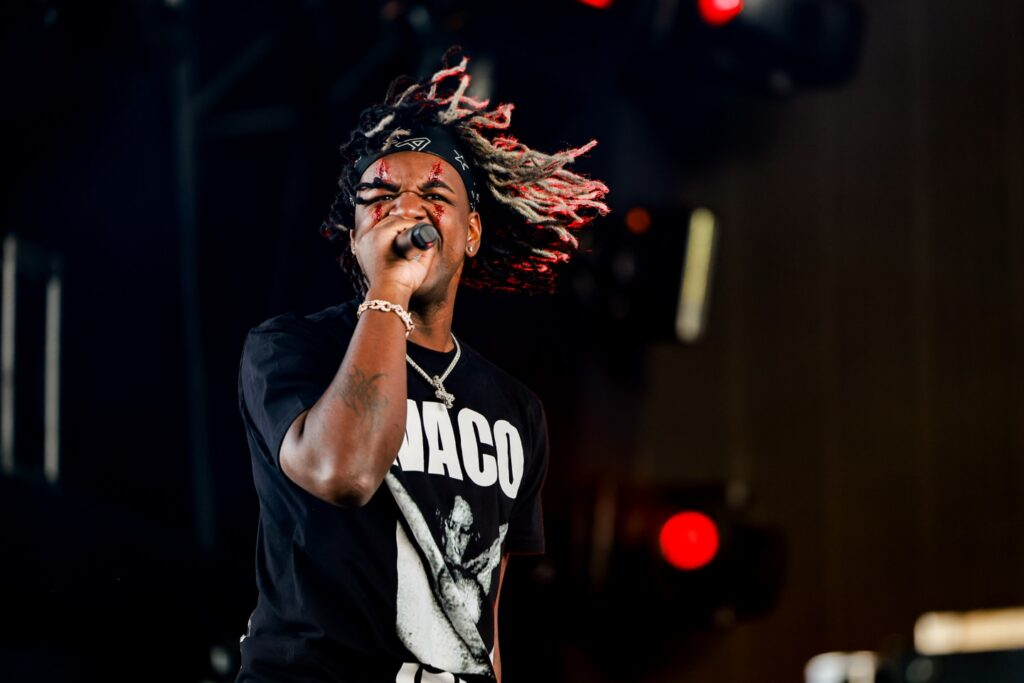
Ken Carson performing at Coachella 2024.
Photo by Matt Winkelmeyer/Getty Images for Coachella
During the meme stock/non-fungible token (NFT) mania of 2021, I was working for a website that covered the stock market. Every week, there would be a new series of 8-bit avatars or AI-generated images sold for eye-watering amounts (occasionally millions). These digital tchotchkes were often hastily compiled derivatives of already-successful ventures, not only cribbing their aesthetics but copy-pasting code wholesale from other developers’ work. But they sold out anyway, because investors believed the hype — or at least they could make a profit off someone else who actually did.
I was reminded of this slightly surreal period of my life in the middle of a heaving mosh pit at Ken Carson’s Cincinnati show in late October, my glasses fogging up as other people’s sweat soaked into my clothing. To be sure, rage rap holds more artistic value than a Beeple, and Carson is one of the subgenre’s most consistent practitioners; fall 2023’s A Great Chaos notched new commercial and critical highs, and his live shows have evolved into gladiatorial spectacles as the size of his venues has swelled. Compared to his OPIUM labelmates — ever-elusive boss Playboi Carti, aura-depleted Destroy Lonely, and barely-there Homixide Gang — Ken has had an excellent year. This consistency (rather, his lack of inconsistency) has turned him into the record label’s defacto nucleus and, by extension, the face of rage in 2024.
Rage, the plugg-and-tread-derived strain of rap popularized by Carti’s urtext Whole Lotta Red, is a hyper-commodified scene, perched at the intersection of disaffected youth art and streaming technology and dressed in DHGate Rick Owens and $50 tour merch. Over the past four years, rage has gone from derided “mumble rap” offshoot to a populist style, strip-mined by mainstream artists and copycats (both adept and inept) hoping to carve out their own piece of the royalties. Factor in that even the best of this music sounds indistinguishable to the untrained ear — it’s meant to be played loud, which further obliterates nuances — attempting to discern which rage songs are actually good, and not just “not bad,” quickly begins to feel like shoveling through shitcoins.
In a different era, this might not affect Ken Carson at all, buoyed above the competition through a combination of sonic vision, practiced talent, and copious resources. Mired in the endless sludge of the attention economy, however, things are a little different. Right now, his only true peer is Yeat (Carti exists in a higher tier beside Young Thug and Travis Scott, while Destroy Lonely is soldiering through an ongoing domestic abuse case and vicious fan backlash to LOVE LASTS FOREVER). But a plethora of up-and-coming artists are mutating rage into something harder (tdf; OsamaSon), weirder (d0llywood1; maajins), or simply more fun (prettifun; Mel V Chapo). Specialized to streaming niches like Darwin’s finches, they won’t conquer Carson’s fans en masse, but that still leaves the bread-and-butter OPIUM sound feeling formulaic or stale.
“Attempting to discern which rage songs are actually good, and not just ’not bad,’ quickly begins to feel like shoveling through shitcoins.”
This is a structural issue that only compounds when dissecting the live experience. On stage, Carson was an adequate showman, half-screaming over backing vocals as he bounced around the stage, though I presume he would be more locked in if you caught him at a larger tour stop. The mosh pit was vigorous enough, though it’s hard to say the crowd was more excited by Carson performing “Fighting My Demons” than the pre-show DJ spinning “H00DBYAIR” and “Location” (OPIUM tours gotta be the easiest opening gig in the world). It might be more accurate to characterize the crowd as “energetic” than “engaged,” an indicator of the role this music fills in their lives: It’s a soundtrack for Epic Moments and Instagram slideshow dumps; they paid money to see Carson, but sonics matter less than the social milieu.
Which is fine, if a little dispiriting. It’s not like the party is ending anytime soon: In fact, rage has never been bigger. Yeat just scored a Billboard no. 1 for his “most polished” album yet, LYFESTYLE, and Carti netted an eye-watering 44 million streams in just one week with his September single “ALL RED.” Despite my personal fatigue and broader cultural indicators (Carti’s run of January singles swung back towards Atlanta trap and plugg), I wouldn’t go so far as to prognosticate the ”end of rage” any time soon. But standing in the middle of the pit, swarmed by sweaty teenagers, I couldn’t help but notice the shimmering edges of the bubble, swelling with every exhale, liable to pop at any moment.
